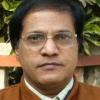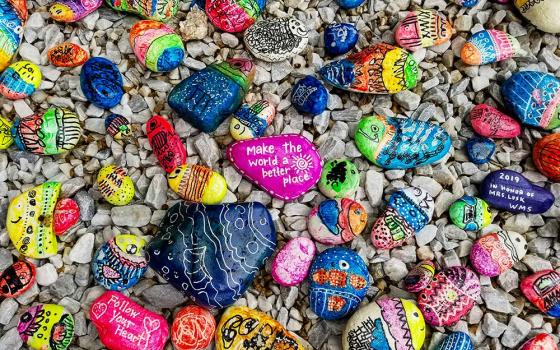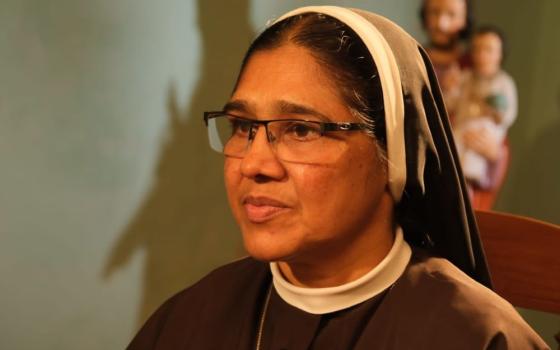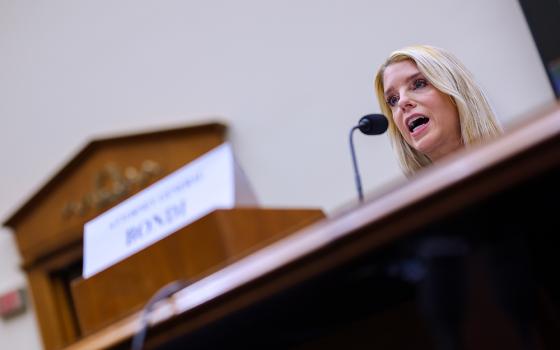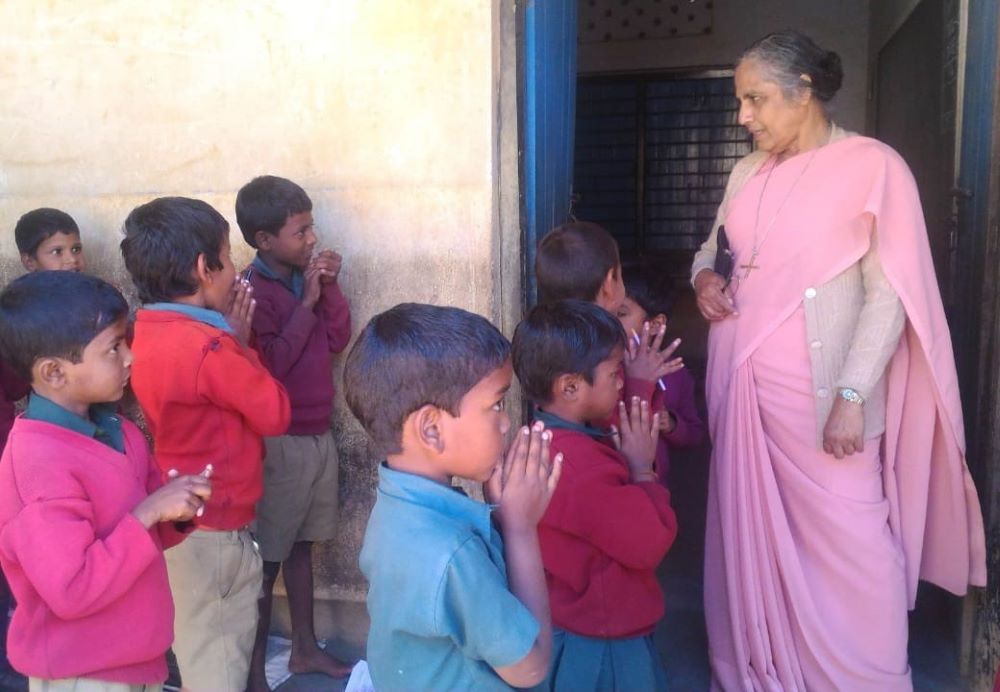
Holy Cross Sr. Rosily Kolencherry visits a school in Bihar, India, where parents she helped train in skilled trades send their children. (Courtesy of Rosily Kolencherry)
Sr. Rosily Kolencherry has organized more than 60,000 women into self-help groups across Bihar state, empowering them to tackle social issues and launch income-generating projects during her four decades of ministry in eastern India.
The 73-year-old member of the Sisters of Mercy of the Holy Cross, commonly known as Holy Cross Sisters, led her congregation's social work agency — the Holy Cross Social Service Centre in Hazaribagh — for 33 years until 2015.
She launched a self-help group program in 1982 to support socially and economically disadvantaged Dalit and tribal families. She formed 5,194 groups, helping approximately 62,320 women.
It has become a movement in eastern India, empowering women to challenge bonded labor, alcoholism, violence and other rights violations against women. It also supports their participation in programs such as building village schools, check dams, irrigation projects and starting forestry initiatives.
They also collaborate on thrift loans and income-generating projects, such as poultry, aquaculture and piggery, as well as setting up brick kilns, rice mills, flour mills and tailoring facilities.
Kolencherry has received 17 awards at regional, national and international levels, including two presidential awards: in 2006 for outstanding humanitarian service and in 2007, the National Water Award for her work to conserve groundwater. She has raised women's issues at international conferences in Switzerland, China, England, the United States, Burkina Faso and Canada.
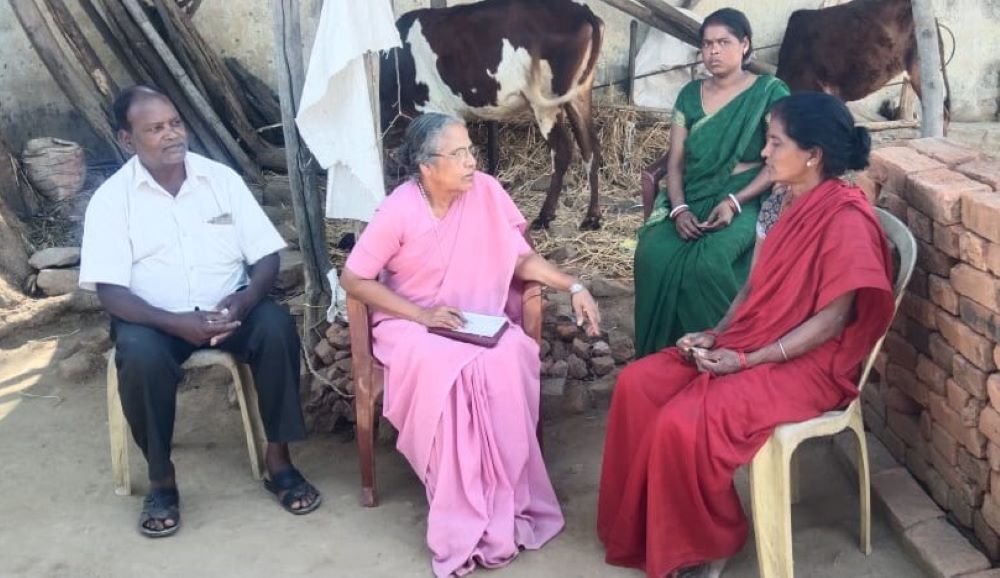
Holy Cross Sr. Rosily Kolencherry interacts with women who formed self-help group income-generating activities like animal husbandry. (Courtesy of Rosily Kolencherry)
The nun, who also led the central province of her congregation from 2015 to 2021, spoke about her work and its challenges in an interview with Global Sisters Report..
GSR: What made you commit yourself to social service?
Kolencherry: In the 1960s, I read about and heard of Mother Teresa of Calcutta, who dedicated her life to serving the poorest of the poor, the abandoned and the dying. Her story inspired me to become a missionary in northern India, where I could help those in greatest need.
Sr. Sigrid Voggel, the first provincial of our Indian Province (1970-1979) and my superior at the Vocational Training Institute convent (1980-1986), encouraged me and entrusted me with responsibilities, as well as the freedom to pursue social service as a ministry.
Can you illustrate your work with an example?
In early 1982, I was working with bonded laborers from the lower-caste community (officially called Scheduled Caste people) in a village here in Hazaribag. I aimed to empower them at every level and make sure they stood up for their rights.
I gathered 16 families from the village and formed a committee called the Ujjwal (Bright) Committee. These families shared 16 acres of land that the government provided to them through a project called Bhoodan (land donation) in 1956. It was meant to help them cultivate the land and become self-sufficient. However, they couldn't farm the land because there was no water. As a result, they continued to work as bonded laborers for landlords.
For over 25 years, the land stayed unused. In 1982, after four meetings, attended by everyone in the village, including women and children, a committee was formed. It decided to establish a pre-primary school, build a pond and create a community hall.
We also decided to plant fruit and timber trees but kept 10 acres of land unused. The villagers worked on the land, and the Holy Cross Social Service Centre paid them. The meeting also agreed to collect 50% of the payment to create a common fund for future village projects.
The water shortage was addressed by digging wells and excavating a large pond, which provided employment for both men and women from underprivileged communities. Today, even after 43 years, the pond remains an important part of the community.
All the villagers worked together on the project. Since 2000, they have managed all the activities in their village, except for the primary school, where they needed our support and guidance. That is an example of true development and empowerment by the village committees and women's groups.
How do you look at social service in relation to your role as a missionary?
Serving people is not just an expression of concern or a task to complete. It is a calling that reflects my Christian faith in action, which involves working to empower the poor. It is the Gospel (Luke 4:18) that compels me to work for the release of the captives and to free the oppressed.
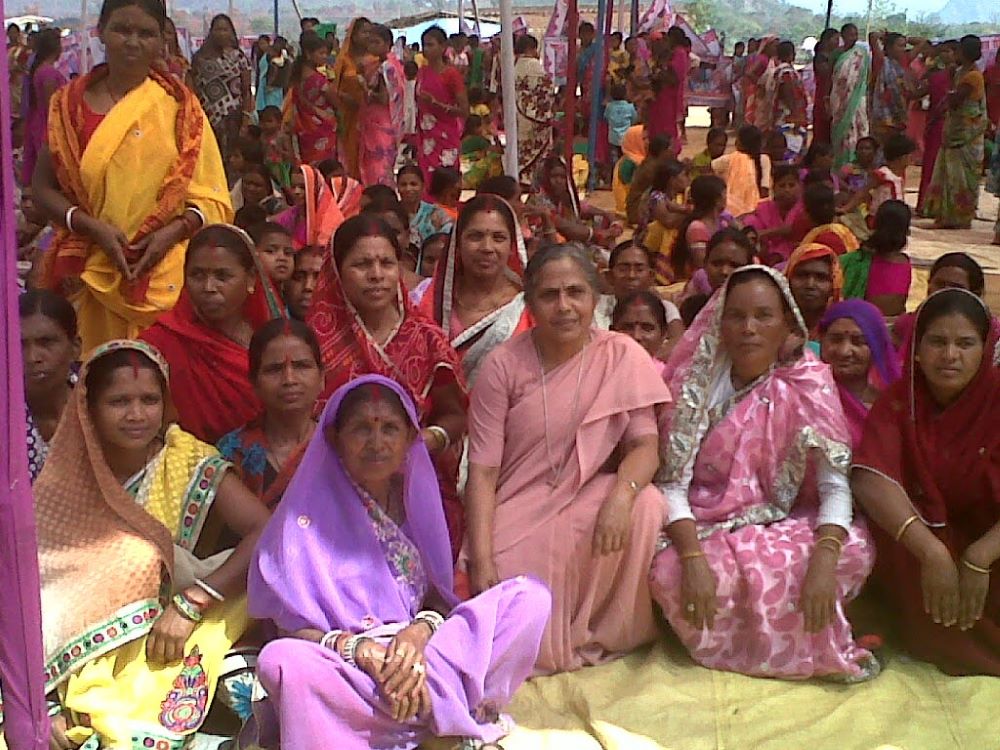
Sr. Rosily Kolencherry poses with a group of women who are invited to task force committee meetings to brief them about government development programs. These women played a leading role in the implementation of the Total Literacy Campaign in the area. (Courtesy of Rosily Kolencherry)
For me, social service is a way of life, an essential part of living a holy life and building a community rooted in love and compassion. My work has been to create a community that embodies the values of love, solidarity and mutual care. Through development work and empowering the marginalized, I fulfill the Gospel mandate and the congregation's mission of compassion.
What is your vision for the beneficiaries of your service?
My vision to reach out to marginalized people, especially women in villages, is because I want to be physically present where people are in need. I wanted to meet them at their point of suffering, offering development programs, empowerment, education, health care, or simply listening to them. It is more than addressing immediate material needs; it aims to help people develop the tools for a dignified and self-sustaining life.
Through work with the poor, marginalized and vulnerable, we are creating a more just and loving world that reflects God's love and grace. This vision inspires others to view social service not just as a duty, but as a meaningful calling — a way to live out the Gospel in the world.
How does civil society, including the beneficiaries and authorities, look at your social service?
Civil society values my dedication to helping those often overlooked by mainstream society. They recognize my empathy and selflessness in working with the poor in remote areas. Supporting young women through education is especially crucial because it can break the cycle of poverty.
Some see me as a role model who works without seeking recognition and truly cares for the poor. Civil society respects my dedication to a higher cause and my willingness to make personal sacrifices for others.
Why does mainstream society marginalize a group of people ?
In South Bihar (now Jharkhand state) during the 1980s and 1990s, the lives of marginalized communities were marked by economic hardship, limited access to resources and social exclusion. (Editor's note: The traditional four-tiered Hindu caste system views those outside it, such as Dalit and tribal people, as of lower dignity and excludes them. Although such discrimination was banned in 1950, it persists in subtle ways, especially in villages.)
These communities, mainly tribal populations in Jharkhand, faced issues such as land alienation, displacement caused by development projects, and limited access to education and health care. Their traditional ways of making a living were often disrupted, leading to increased poverty and reliance on forest resources. These extremely poor people depended on forests for their livelihood and were heavily in debt to money lenders who exploited them. They needed more than just assistance — they needed to recover and become empowered.
Advertisement
What were some of the obstacles you faced in your work?
I have faced many challenges — personal, cultural, emotional and physical. But from the very beginning, I viewed these difficulties as a vital part of my life and mission. They no longer trouble me, and I remain at peace.
When I encounter useless remarks, I surrender to God and pray for that person. If possible, I will discuss and resolve the issue. However, each obstacle also helped strengthen my faith and sharpen my commitment to selfless service. Through it all, I stayed faithful to my calling, finding ways to overcome these challenges by trusting in God's will and continuing to serve others with compassion and dedication.
Did you encounter any opposition from the local people?
When I started working in interior villages, I faced some cultural differences and societal attitudes that I had to navigate. At first, I experienced some resistance, but it gradually faded away. I needed extra patience, humility, energy and time to understand the people's mindset and ways of doing things.
Sometimes, I faced internal conflict between my personal desire to serve the poor in the way I felt called to and the practical needs and limits. The struggle to balance my vision with community expectations was tough. I always made myself available to people in the office or villages, without counting time or considering my own needs, including food and rest.
Have you faced allegations of conversion from Hindus, who are a majority?
Never. From the very beginning, we have employed staff from diverse caste, cultural, linguistic and religious backgrounds. Our field staff were always Hindus, Muslims, Christians, tribal and non-tribal. We were always transparent with the community about our mission: to develop the area and enhance the economic, educational and political standing of its people. We emphasized that our work was to help them become self-sufficient and integrated into the mainstream.
The community never raised concerns about religious conversion, and they have consistently welcomed our presence. If any doubts existed, the villagers had the opportunity to discuss them with our staff and local leaders.
How would you like to be remembered?
I hope to be remembered for organizing, strengthening and empowering thousands of poor women through self-help groups as a movement. This movement has helped women, even in the most remote villages of Hazaribag and Ramgarh Districts, to gain dignity, respect, self-worth and decision-making power in their families.
I might be remembered for helping create village leaders. We have built the second and third tiers of leadership within self-help groups, their clusters and federations, giving them the power to manage their own issues. They are now able to engage in meaningful conversations with government officials and politicians. Some of them have even won local elections.
Some people might remember me as someone who worked to eliminate poverty and enhance the economic situation, lifestyle, social status, health and hygiene of marginalized communities, as well as their children's education, among other efforts.
Some may remember me as the person who started Catholic social work for underserved communities in the most challenging rural areas of Bihar. Others might recall me as someone who collaborated with civil society and the government to improve villagers' lives, promoting peace and harmony.
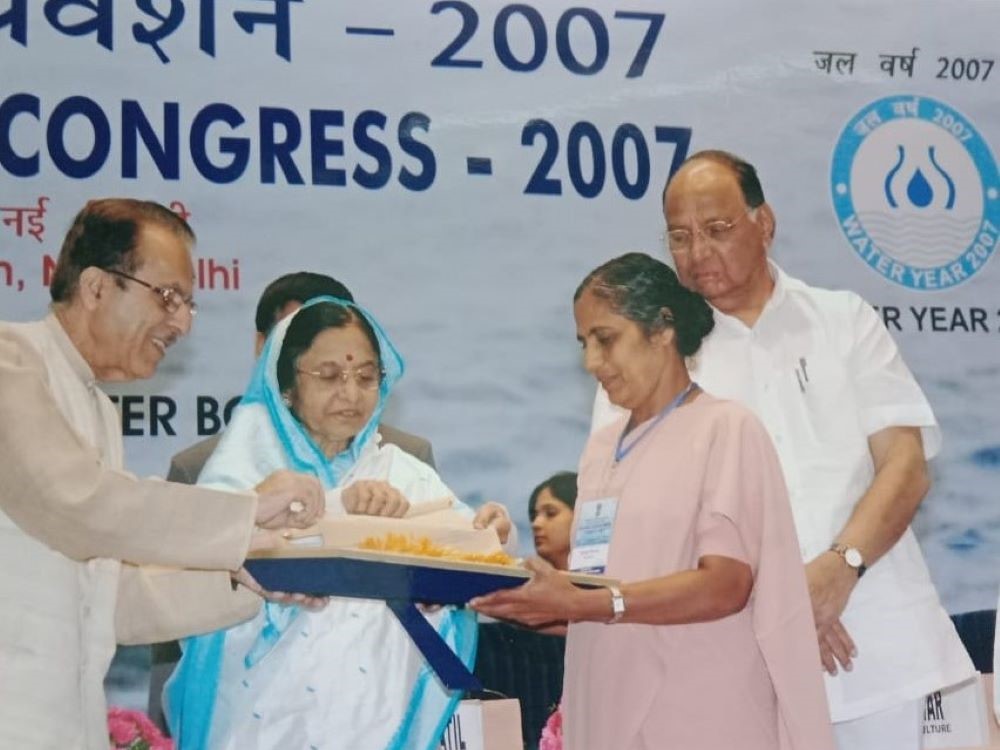
Sr. Rosily Kolencherry receives a conservation award from the Ministry of Water Resources.Sept. 11, 2007, in Vigyan Bhawan, New Delhi, India, for adopting innovative practices of ground water augmentation through rain water harvesting and artificial recharge. The award was given by India's then president, Pratibha Devi Singh Patil. (Courtesy of Rosily Kolencherry)
I might also be remembered for hosting the first-ever workshop on the nomadic Birhor tribe on Oct. 21, 1995, in Hazaribagh District. More than 400 Birhor people participated, coming from 53 Birhor colonies in the district.
What is your greatest satisfaction?
My greatest happiness comes from a deep sense of fulfillment that arises from living my calling. Throughout my life, I have grown spiritually — becoming more aligned with God's will and strengthening my relationship with him. Every act of service to others has helped me develop greater spiritual maturity.
It is incredibly fulfilling to know that I have truly made a difference in the lives of thousands of families — women, men and children alike. I take joy in knowing I am fulfilling God's will and making a tangible impact on others. My deep satisfaction in religious life comes from a mix of spiritual fulfilment, helping others and personal growth.
Why did your superiors allow you to continue in the same mission for 33 years, without a transfer?
I have no idea why the superiors didn't give me a transfer, nor had I asked for one. I follow the sayings of our co-founder Blessed M. Teresa Scherer, "Do what lies in your power day after day."
My superiors and fellow sisters appreciated me and encouraged my efforts. They were pleased with the progress at the social service center. Many sisters were assigned to work with me to gain experience in social work. Some stayed for three months or a year before moving on to social work elsewhere.
I am deeply grateful to God and the provincial superiors for allowing me to dedicate 33 continuous years to the Holy Cross Social Service Centre in Hazaribag, serving the people and the nation.
